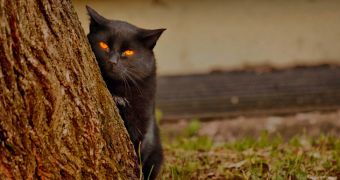A new batch of official army documents published online reveal that British intelligence officers suspected two cats and a dog were spying for the Germans during World War I.
On Thursday, The National Archives in Kew, London, released 3,987 diaries of British soldiers as part of a series of events designed to mark this year’s centenary of the outbreak of the First World War.
The documents reveal that officers from the 36th brigade of the 12th Division noticed that the three animals were repeatedly crossing British lines on the Western Front in July 1915. They became suspicious, thinking that the animals were probably carrying messages between the trenches.
“Two cats and a dog are under suspicion, as they have been in the habit of crossing our trenches at night; steps are being taken to trap them if possible,” the report reads, according to the Telegraph.
Although the officers were apparently planning on trapping the animals, the documents do not mention if the alleged spies were ever caught.
However, David Langrish, records specialist for the National Archives, said in an interview with the aforementioned publication that the soldiers' concerns showed their increased interest in new forms of warfare on the Western Front.
“The case of the dog and two cats, shows the level of suspicion amongst military units at this time. Every detail was of potential importance for the planning of further operations, and so every possible suspicion would have been reported.”
On the other hand, this specific diary can be considered an important piece of historical evidence which shows the level of fear and paranoia the British intelligence officers were experiencing in those terrible war moments.
In the same report, it is revealed that the British tried to tease and mock the nearby German troops putting up a board with news about the capitulation of the German forces in South West Africa.
“The enemy attempted to knock it down with rifle fire, and having failed, used very lurid language,” it says.
It is believed that the taunting might have represented the British troops' response to another incident in which the Germans flew a brown paper kite across the British lines with an insulting message written on it: “You can fill your trenches with devils – we Germans fear nothing in the world… Englishmen, how badly you shoot!… You Englishmen – we have wine, sausage, and meat – your Englishmen are hungry and thirsty… You stupid soldiers!”
This is the second batch of diaries from the WWI published by The National Archives, as the first lot was released in January and more are expected in the next few months.

 14 DAY TRIAL //
14 DAY TRIAL //